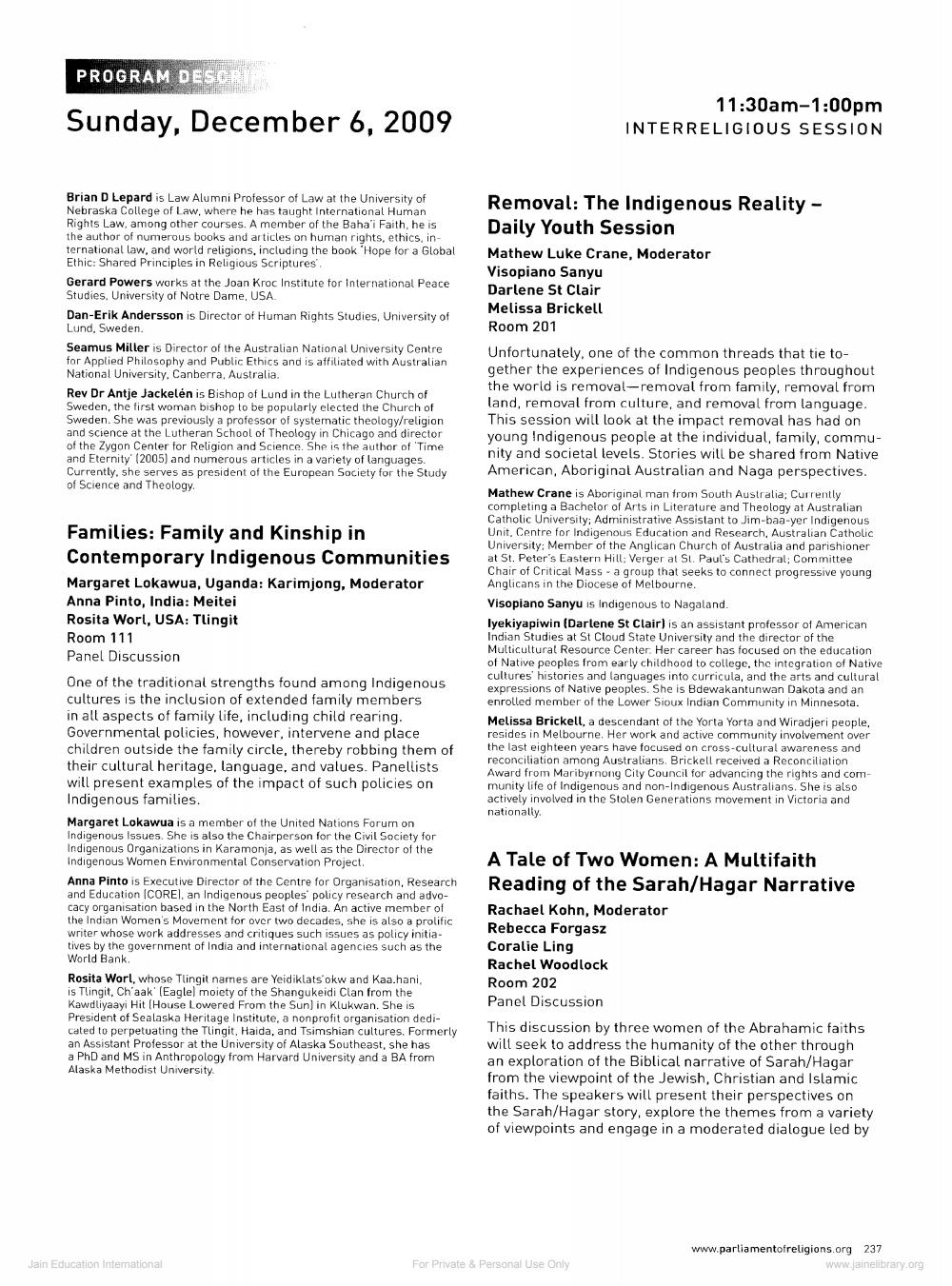________________
PROGRAM DESCRIP
Sunday, December 6, 2009
Brian D Lepard is Law Alumni Professor of Law at the University of Nebraska College of Law, where he has taught International Human Rights Law, among other courses. A member of the Baha'i Faith, he is the author of numerous books and articles on human rights, ethics, international law, and world religions, including the book "Hope for a Global Ethic: Shared Principles in Religious Scriptures.
Gerard Powers works at the Joan Kroc Institute for International Peace Studies, University of Notre Dame, USA.
Dan-Erik Andersson is Director of Human Rights Studies, University of Lund, Sweden.
Seamus Miller is Director of the Australian National University Centre for Applied Philosophy and Public Ethics and is affiliated with Australian National University, Canberra, Australia.
Rev Dr Antje Jackelén is Bishop of Lund in the Lutheran Church of Sweden, the first woman bishop to be popularly elected the Church of Sweden. She was previously a professor of systematic theology/religion and science at the Lutheran School of Theology in Chicago and director of the Zygon Center for Religion and Science. She is the author of 'Time and Eternity (2005) and numerous articles in a variety of languages. Currently, she serves as president of the European Society for the Study of Science and Theology.
Families: Family and Kinship in Contemporary Indigenous Communities Margaret Lokawua, Uganda: Karimjong, Moderator Anna Pinto, India: Meitei
Rosita Worl, USA: Tlingit Room 111
Panel Discussion
One of the traditional strengths found among Indigenous cultures is the inclusion of extended family members in all aspects of family life, including child rearing. Governmental policies, however, intervene and place children outside the family circle, thereby robbing them of their cultural heritage, language, and values. Panellists will present examples of the impact of such policies on Indigenous families.
Margaret Lokawua is a member of the United Nations Forum on Indigenous Issues. She is also the Chairperson for the Civil Society for Indigenous Organizations in Karamonja, as well as the Director of the Indigenous Women Environmental Conservation Project.
Anna Pinto is Executive Director of the Centre for Organisation, Research and Education (CORE), an Indigenous peoples' policy research and advocacy organisation based in the North East of India. An active member of the Indian Women's Movement for over two decades, she is also a prolific writer whose work addresses and critiques such issues as policy initiatives by the government of India and international agencies such as the World Bank.
Rosita Worl, whose Tlingit names are Yeidiklats okw and Kaa.hani, is Tlingit, Ch'aak' (Eagle] moiety of the Shangukeidi Clan from the Kawdliyaayi Hit (House Lowered From the Sun) in Klukwan. She is President of Sealaska Heritage Institute, a nonprofit organisation dedicated to perpetuating the Tlingit, Haida, and Tsimshian cultures. Formerly an Assistant Professor at the University of Alaska Southeast, she has a PhD and MS in Anthropology from Harvard University and a BA from Alaska Methodist University.
Jain Education International
11:30am-1:00pm
INTERRELIGIOUS SESSION
Removal: The Indigenous Reality
Daily Youth Session
Mathew Luke Crane, Moderator
Visopiano Sanyu
Darlene St Clair Melissa Brickell Room 201
Unfortunately, one of the common threads that tie together the experiences of Indigenous peoples throughout the world is removal-removal from family, removal from land, removal from culture, and removal from language. This session will look at the impact removal has had on young Indigenous people at the individual, family, community and societal levels. Stories will be shared from Native American, Aboriginal Australian and Naga perspectives.
Mathew Crane is Aboriginal man from South Australia; Currently completing a Bachelor of Arts in Literature and Theology at Australian Catholic University; Administrative Assistant to Jim-baa-yer Indigenous Unit, Centre for Indigenous Education and Research, Australian Catholic University; Member of the Anglican Church of Australia and parishioner at St. Peter's Eastern Hill: Verger at St. Paul's Cathedral; Committee Chair of Critical Mass a group that seeks to connect progressive young Anglicans in the Diocese of Melbourne.
Visopiano Sanyu is Indigenous to Nagaland.
Iyekiyapiwin (Darlene St Clair) is an assistant professor of American Indian Studies at St Cloud State University and the director of the Multicultural Resource Center. Her career has focused on the education of Native peoples from early childhood to college, the integration of Native cultures' histories and languages into curricula, and the arts and cultural expressions of Native peoples. She is Bdewakantunwan Dakota and an enrolled member of the Lower Sioux Indian Community in Minnesota. Melissa Brickell, a descendant of the Yorta Yorta and Wiradjeri people, resides in Melbourne. Her work and active community involvement over the last eighteen years have focused on cross-cultural awareness and reconciliation among Australians. Brickell received a Reconciliation Award from Maribyrnong City Council for advancing the rights and community life of Indigenous and non-Indigenous Australians. She is also actively involved in the Stolen Generations movement in Victoria and nationally.
A Tale of Two Women: A Multifaith Reading of the Sarah/Hagar Narrative Rachael Kohn, Moderator
Rebecca Forgasz
Coralie Ling Rachel Woodlock Room 202
Panel Discussion
For Private & Personal Use Only
This discussion by three women of the Abrahamic faiths will seek to address the humanity of the other through an exploration of the Biblical narrative of Sarah/Hagar from the viewpoint of the Jewish, Christian and Islamic faiths. The speakers will present their perspectives on the Sarah/Hagar story, explore the themes from a variety of viewpoints and engage in a moderated dialogue led by
www.parliamentofreligions.org 237
www.jainelibrary.org




